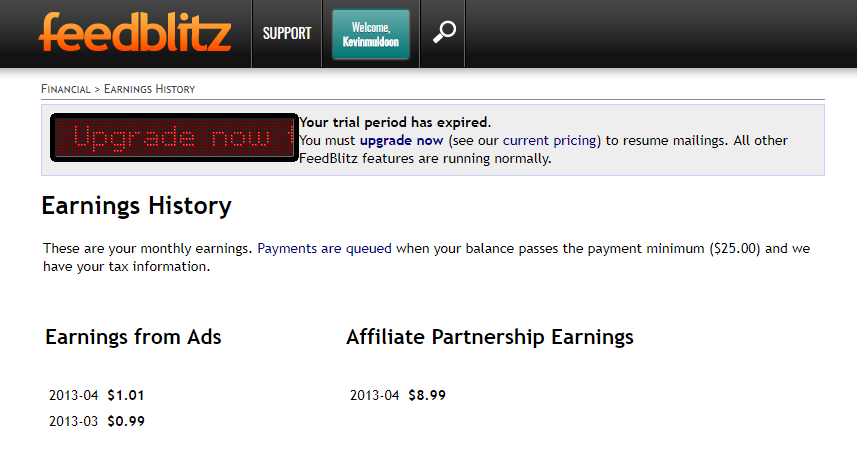Affiliate marketing is a great way to make money online. If you are successful it can provide you with passive income for years.
Who doesn’t want an endless stream of money coming into their bank account?
I am going to make a concious effort to step up and increase my affiliate income. In the past I made a lot of money through affiliate marketing and I want to get back to that same level.
Unfortunately, the affiliate world isn’t all sunshine and rainbows. As an affiliate marketer you need to have a thick skin and be prepared to be screwed over on a regular basis.
I talk about this in the video below.
Keep reading on to get a better understanding of how I’ve been screwed over by affiliate companies this year.
Affiliate Programs Closing Without Letting Affiliates Know
This isn’t my first complaint or rant about negative experiences in affiliate marketing. I spoke about issues in-depth in the article “Eleven Reasons Affiliate Marketing Sucks” and touched upon it in other articles such as “WordPress Companies Need to Do More for Affiliates” and “When Should Affiliates Stop Promoting a Product?“.
Despite my frustrations with affiliate marketing, I do want to increase my affiliate income and show all of you how I am going to do that, so my future blog posts about this topic will hopefully be more positive.
This week I have been reviewing existing affiliate programs and reviewing ones I could join and actively promote. I am going to document this research in an article for you guys so stay tuned :)
Whilst reviewing links in my webmaster resources area the other day I found many of the companies I was promoting were not active anymore.
- Several companies had been bought over and merged with other companies
- Many companies no longer existed
- One email marketing company was now linking to a movie rental service (I’m not even joking!)
There is one thing that ties all of these companies together; None of them advised affiliates that their affiliate program was closing. They continued to allow affiliates to promote their company without as much as an email.
It is a reminder of how little companies value the affiliate marketers who are spending time and money to send them traffic.
A similar incident occurred last month with an established WordPress company (I don’t want to point the finger at them so won’t name them).
The company contacted me and asked about helping me promote their themes. I attempted to login to my affiliate account, but my login information was not working and the password reset stated that no account was registered with my email accounts.
After requesting help with this issue I was informed that several months ago they had some issues with their database and some of the old stale accounts have been removed. They checked and confirmed that my affiliate account was disabled.
What the F**k!!
I had been sending traffic to them for several months and they were not tracking conversions. I had no account, no evidence of traffic being sent, no evidence of conversions, and no idea whether I had a lot of money in my account previously or during the months after my account was closed.
The fact that they would do this is worrying. At the very least, all the hard work I put into writing articles to help promote their products warranted an email.
When I queried the whole thing they advised that could only see the user ID, but not account details of affiliates such as username and email, so they couldn’t inform me of what happened.
This seems like a cop out in my opinion as a quick look at their traffic stats would have shown what websites were sending them traffic and from there see the exact affiliate ID being used.
This situation demanded a full investigation so that no affiliate lost out. None was performed.
The company were still keen to work with me, but how can I work with a company that would do that to affiliates?
I may have lost $20, I may have lost $400. I don’t know and I will never know as my affiliate account no longer exists.
This is a stark reminder of how little companies think of their affiliates.
Making Money Blind
Sometimes you find the right product to promote, but the affiliate program is very poor.
FeedBlitz is a good example of this. Four years ago I was using the service and published a thorough review of what it could and could not do (the review was over 11,000 words).
Their affiliate program paid 10% of commissions initially rising up to 40% when over $100 is billed. On paper, it seemed like the perfect product to promote.
As I write this article I have sent FeedBlitz over 4,050 visitors and to date this has generated me nothing. I have generated $8.99 in commissions, which doesn’t even meet the minimum payout requirement, so no payment will be made.

It pays to be a little skeptical when you’re an affliate.
Sending over 4,000 targeted visitors to a service and generating no money raises suspicions. Unfortunately, I cannot check anything. FeedBlitz provides no way of analysing traffic or conversions.
With no reports to refer to, I am completely blind as to what is happening.
The Affiliate Selection Process
All of these experiences highlight the importance of being selective with what you actively promote. You should not invest time or money into promoting a product or service if the company does respect its affiliates.
A company should provide affiliates with support and provide them with the necessary tools to generate conversions. This will help both the affiliate and the company make more money.
Even if you select a good product or service to promote from a company that treats affiliates well, there is still no guarantee you will make money with them.
I have recommended some great products over the years that generated me no commissions, whilst a solitary link in an unrelated blog post to another product or service generated me thousands.
You need to test a lot of affiliate programs and then see which one converts well. Annoyingly, the affiliate programs that generate good commissions do not provide good support.
Have you been treated badly as an affiliate? If so, please leave a comment below and share your experience.
Thanks for reading.
* Featured Image Credit: Andrew T Thrasher

